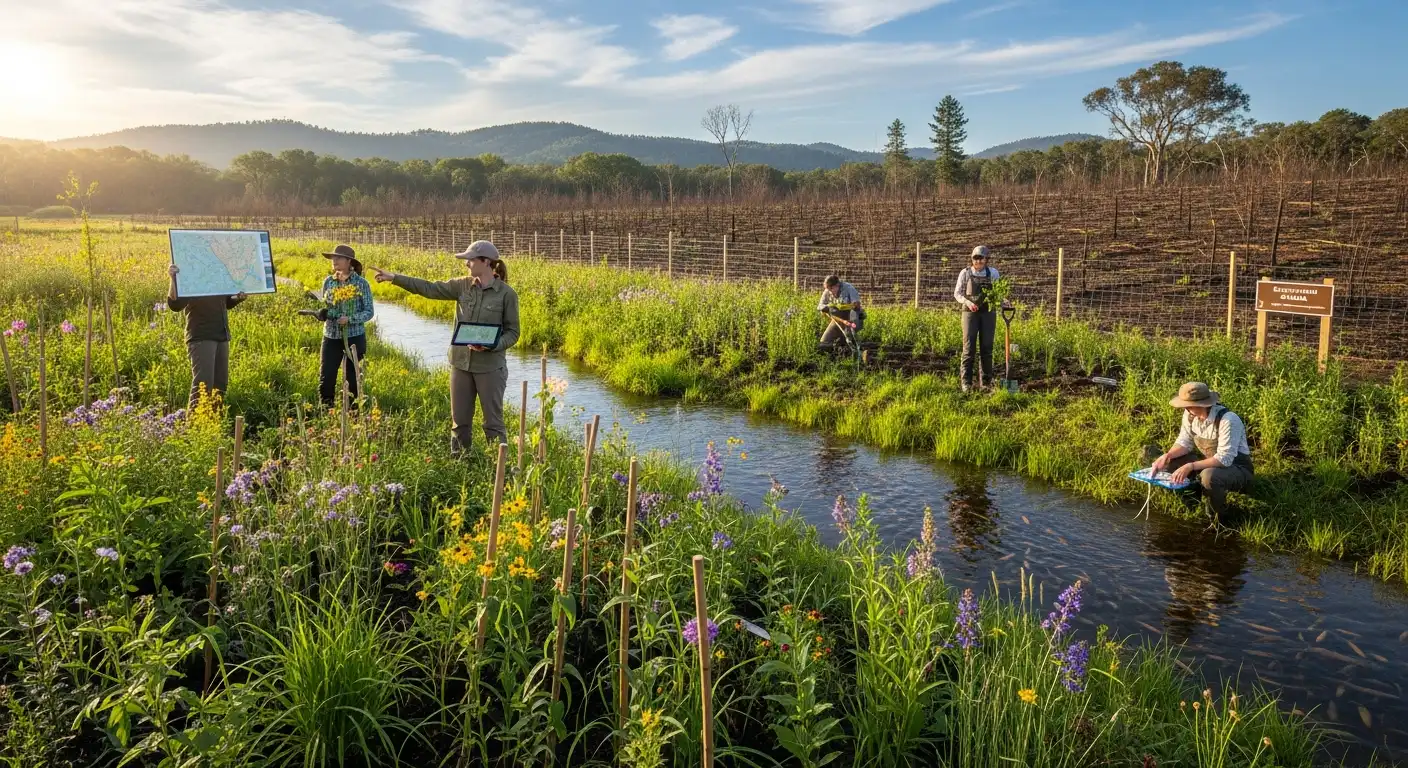Ecosystem services are the remarkable benefits that the natural world provides to humanity. They are the invaluable contributions of ecosystems, including forests, wetlands, oceans, and grasslands, that support and enhance our quality of life. This article will explore ecosystem services, their types, significance, and their essential role in sustaining our planet and human well-being.
Understanding Ecosystem Services
Ecosystem services encompass various functions and benefits that ecosystems provide to humans and the environment. They are often categorized into four primary types.
Provisioning Services
These services include the tangible products we directly obtain from ecosystems, such as food, water, timber, and medicinal plants. Provisioning services are fundamental for human survival and development, as they supply essential resources for our sustenance and economic activities.
Regulating Services
Regulating services involve the natural processes that ecosystems perform to regulate environmental conditions. This includes the purification of air and water, the regulation of climate, and the control of disease vectors. These services are vital for maintaining a stable and habitable environment.
Supporting Services
Supporting services underpin the production of all other ecosystem services. They include processes like nutrient cycling, soil formation, and pollination. Supporting services are essential for ecosystem functioning and the provision of other services.
Cultural Services
Cultural services are the non-material benefits that ecosystems offer, such as spiritual and recreational experiences, artistic inspiration, and educational opportunities. These services contribute to our cultural identity, well-being, and sense of place in the natural world.
The Significance of Ecosystem Services
Ecosystem services are paramount, touching every facet of human existence, well-being, and prosperity.
Human Survival
Many provisioning services, such as food and clean water, stand as the bedrock of human survival. Agriculture, fisheries, and the provision of fresh water are intricately woven into our daily lives, ensuring that basic human needs are met. The fertile soils yielding our crops, the abundance of marine life-sustaining coastal communities, and the pristine water sources quenching our thirst all testify to the life-sustaining gift of ecosystem services.
Economic Benefits
Ecosystem services bear substantial economic weight, contributing to livelihoods, employment, and economic growth. Agriculture, for instance, hinges upon ecosystems for soil fertility and crop pollination, underpinning global food security. Fisheries, another vital provisioning service, provides sustenance and supports the livelihoods of millions worldwide. Furthermore, forests furnish timber and non-timber forest products, forming the basis of various industries and livelihoods.
Environmental Resilience
Regulating services act as nature’s insurance policy, safeguarding against environmental disruptions. Ecosystems orchestrate the purification of air and water, ensuring that we have access to clean resources for our well-being. Ecosystems also play a vital role in climate regulation, sequestering carbon dioxide and mitigating climate change. Wetlands, in particular, act as natural sponges, soaking up excess water during storms and averting floods. These services shield us from environmental extremes, contributing to the resilience and stability of our surroundings.
Biodiversity Conservation
Ecosystems are teeming with biodiversity, a testament to the interconnectedness of life on Earth. Preserving ecosystems is synonymous with conserving biodiversity, an indispensable element for their resilience and adaptability. The intricate relationships between species, finely tuned over millennia, provide ecosystems with the flexibility and responsiveness to cope with changing conditions.
Threats to Ecosystem Services
However, the very services that sustain us are under relentless assault from various threats.
Habitat Loss and Degradation
One of the most pressing threats to ecosystem services is habitat loss and degradation. The relentless march of urbanization, deforestation, and land-use changes has led to the destruction and fragmentation of natural habitats. This disruption severely compromises ecosystems’ functioning and ability to deliver services.
Pollution
Pollution from industrial, agricultural, and urban sources poses a pervasive threat to ecosystem services. Contamination of the air, water, and soil can adversely affect the quality and availability of these services. Pesticides, chemical runoff, and air pollutants can all disrupt the delicate balance of ecosystems.
Climate Change
Climate change, driven by greenhouse gas emissions, alters ecosystems’ distribution and functioning. Rising temperatures, shifting weather patterns, and rising sea levels transform the landscapes, and ecosystems struggle to adapt to these rapid changes.
Overexploitation
Excessive resource extraction, from overfishing to deforestation, can deplete ecosystems and compromise their capacity to provide provisioning services. Unsustainable practices threaten the health of ecosystems and jeopardize the well-being of communities that rely on these services.
Invasive Species
Introducing invasive species can wreak havoc on ecosystems by outcompeting native species and altering their composition. These invasive species disrupt the intricate web of relationships that underpin ecosystem services, leading to cascading effects on human well-being.
Conservation and Sustainable Use
Addressing these threats and safeguarding ecosystem services requires a multifaceted approach.
Protected Areas
Creating and effectively managing protected areas, such as national parks and marine reserves, is instrumental in conserving ecosystems and the services they provide. These sanctuaries act as refuges for biodiversity and help preserve the natural balance of ecosystems.
Sustainable Resource Management
Practicing sustainable resource management is essential for ensuring the continued provision of services. Sustainable agriculture, fisheries, and forestry practices aim to balance human needs with ecosystems’ capacity to regenerate.
Ecosystem Restoration
Efforts to restore degraded ecosystems, such as reforestation and wetland restoration, can revitalize ecosystem services. These restoration initiatives enhance biodiversity and contribute to climate mitigation and resilience.
Biodiversity Conservation
The conservation of biodiversity is closely intertwined with the preservation of ecosystem services. Protecting the web of life within ecosystems enhances their adaptability and resilience, ensuring the continued delivery of services.
The Future of Ecosystem Services
As we navigate the complex challenges of the 21st century, the future of ecosystem services hinges on our choices today.
Sustainable Development
Balancing economic development with the preservation of ecosystem services is a paramount challenge. Integrating the value of ecosystem services into decision-making processes at all levels, from local to global, is essential. This recognition allows us to make informed choices that prioritize sustainability and the long-term well-being of our planet.
Global Collaboration
Addressing global environmental challenges, such as climate change and biodiversity loss, necessitates international collaboration. Multilateral agreements and coordinated efforts among nations are vital in devising strategies and initiatives that protect and restore ecosystem services globally.
Technological Innovation
Technological innovation promises to reduce our ecological footprint while still meeting human needs. Advances in agriculture, water management, renewable energy, and environmental monitoring provide avenues to minimize the impact on ecosystems.
Public Awareness
Raising public awareness about the importance of ecosystem services fosters a sense of stewardship and encourages responsible environmental practices. Informed and engaged citizens are more likely to support policies and actions that protect these invaluable services.
Conclusion
Ecosystem services are the foundation of human well-being and environmental health. Their diverse contributions, from providing food and clean water to regulating climate and enriching our lives culturally, are irreplaceable. Recognizing the value of ecosystem services and taking action to conserve and sustainably manage ecosystems is an ethical imperative for ensuring a prosperous and resilient future for all living beings on Earth. By embracing the concept of ecosystem services, we can forge a deeper connection with the natural world and work collectively to protect and enhance the precious gifts that nature bestows upon us.





